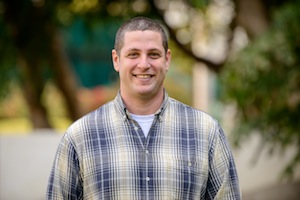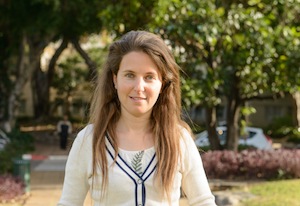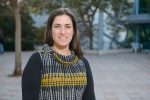Feinberg Graduate School-Weizmann Institute student Vered Shacham-Silverberg is coming to Vancouver with two of her peers. (photo from Weizmann Canada)
Cliché as it may sound, the future is almost here. On March 29, three PhD students from the Feinberg Graduate School at Weizmann Institute of Science (WIS) in Rehovot will arrive in Vancouver. As part of a North American speaking tour called Scientists of Tomorrow, Vered Shacham-Silverberg, Adi Goldenzweig and Uri Weill will share not only details of their research but also their passion for the Weizmann Institute.
Rather than highlighting established scientists, this tour focuses on the experience of students who are performing the experiments being conducted in the labs.
“I believe that we, as students, enjoy many of the benefits the WIS provides and we can shed more light on those benefits,” said Shacham-Silverberg about why she believes she and her colleagues are well-suited to spread the word about what’s happening at the institute.

“We know firsthand how important it is to have a supporting and nurturing environment in research,” said Weill. “We can also bring stories from the working bench of live research that is happening now.”
WIS focuses exclusively on basic science research, the kind of investigation and experimentation that answers big questions. Its students are given the opportunity to have some of the brightest minds in the world as their supervisors and to use some of the best equipment in their research. WIS scientists are uncovering mysteries such as how the body works on the molecular level, and are translating their findings into ways to improve the world in which we live.
For example, Weill is creating a living catalogue of more than 6,000 yeast strains, so scientists can study how certain proteins function both as healthy organisms and diseased ones. His research in the department of molecular genetics could have far-reaching applications to finding cures for many illnesses.
Goldenzweig’s study of how proteins work with molecules has led to the discovery of a way to stabilize proteins that are usually structurally fragile when created in large quantities in a lab. The algorithm she has developed was recently successfully applied to a protein to combat malaria. This could be the key to developing an effective malaria vaccine.
And Shacham-Silverberg is working to discover how to improve the way the body gets rid of unproductive neurons in order to make room for the ones that will lead to best function. Her research will lead to discoveries in neurodegenerative diseases such as Alzheimer’s, ALS and Parkinson’s.
Having these students visit Vancouver is a unique chance for the local Jewish community. The students will not only share some of their research but also their perspectives on being students in Israel.

“Although there are many women in the life science faculties,” said Goldenzweig, “unfortunately … their number decreases dramatically in established positions. But this keeps changing and we’ll hopefully be closer to 50% within a few decades.”
WIS is also interested in promoting benefits for Canadian students interested in science. Every year, two Canadian second-year undergraduate students receive a fully paid two-month supervised internship over the summer in a lab at the institute. Two years ago, one of the recipients of this scholarship was a University of British Columbia student whose experience was so positive, he was asked to return the following summer.
The other program is the Kupcinet-Getz International Summer School, a four-week internship with funding currently for six Canadian students. The program brings together 80 pre-university students interested in research in physics, math, chemistry and the life sciences from a total of 17 countries. Many of these students are experiencing Israel for the first time, and form lasting impressions of and connections to the country. As well, they are introduced to some of the possibilities for their future in science.
The immersive scientific experience is what makes these summer programs so exciting for students, and is part of what drew Shacham-Silverberg, Goldenzweig and Weill to study at WIS.
Weill said he chose the institute because of the access to cutting-edge research tools, which enable him to ask and find the answers to new questions. He added, “At the WIS, we have collaborations with labs from around the world. It makes for the perfect conditions for scientific discovery.”
On March 29, all are welcome to come and learn more about scientific innovation in Israel. At the end of the students’ presentations, a dessert reception will provide a chance to meet the speakers, as well as the Feinberg Graduate School academic secretary, Dr. Ami Shalit. The event is being held in a private home, so if you would like to attend or are looking for more information, contact the WIS Western Canadian development associate, Camille Wenner, at 604-260-8506 or [email protected].
Michelle Dodek is a freelance writer living in Vancouver.

